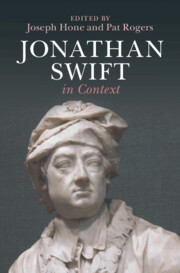Book contents
- Jonathan Swift in Context
- Jonathan Swift in Context
- Copyright page
- Contents
- Notes on Contributors
- Preface
- Acknowledgements
- Chronology
- Abbreviations
- Part I Personal
- Part II Publishing History and Legacy
- Part III Literary Background
- Part IV Genres
- Part V The External World
- Chapter 25 Literary Scene
- Chapter 26 Party Politics
- Chapter 27 Clubs
- Chapter 28 Walpole and the Opposition
- Chapter 29 The Church of England
- Chapter 30 Dissent
- Chapter 31 London
- Chapter 32 Literary Scene
- Chapter 33 The Church of Ireland
- Chapter 34 Dublin
- Part VI Social and Intellectual Topics
- Further Reading
- Index
Chapter 28 - Walpole and the Opposition
from Part V - The External World
Published online by Cambridge University Press: 02 May 2024
- Jonathan Swift in Context
- Jonathan Swift in Context
- Copyright page
- Contents
- Notes on Contributors
- Preface
- Acknowledgements
- Chronology
- Abbreviations
- Part I Personal
- Part II Publishing History and Legacy
- Part III Literary Background
- Part IV Genres
- Part V The External World
- Chapter 25 Literary Scene
- Chapter 26 Party Politics
- Chapter 27 Clubs
- Chapter 28 Walpole and the Opposition
- Chapter 29 The Church of England
- Chapter 30 Dissent
- Chapter 31 London
- Chapter 32 Literary Scene
- Chapter 33 The Church of Ireland
- Chapter 34 Dublin
- Part VI Social and Intellectual Topics
- Further Reading
- Index
Summary
This chapter explores Swift’s persistent hostility towards Sir Robert Walpole through a close analysis of three relatively unknown short political pieces Swift wrote between the summer of 1727 and the winter of 1730. An opening section excavates the origins of Swift’s animosity to Walpole, which had roots in the later part of the reign of Queen Anne, when Swift was involved in the Tory campaign against the Whig lords. The next section looks at the unpublished text ‘The Court and Empire of Japan’, written in late June 1727. The third section analyses ‘A Letter to the Writer of the Occasional Paper’, which takes aim against Walpole’s stable of hack writers, alongside ‘The Answer of the Right Honourable William Pulteney Esq. to the Right Honourable Sir Robert Walpole’. Even in 1730, three years after his last visit to England, he was deploying the full range of his agile, satirical, antagonistic voice against Walpole.
- Type
- Chapter
- Information
- Jonathan Swift in Context , pp. 224 - 231Publisher: Cambridge University PressPrint publication year: 2024

